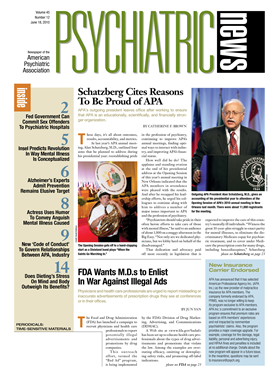Ann (not her real name) possessed a number of assets that have been linked with a reduced risk of Alzheimer's disease. She was married, well educated, intellectually and socially engaged, trim, and very active physically. Nonetheless, she was diagnosed with Alzheimer's at age 68.
Ann's outcome should perhaps come as no surprise in view of an announcement made by an independent National Institutes of Health (NIH) panel: Although a number of factors have been linked with a reduced risk of Alzheimer's disease, none has been firmly demonstrated to prevent it.
As a result, people need to understand that if they eat this or that food or engage in this or that activity to escape Alzheimer's, there is no guarantee that they will do so, the panel concluded.
Or as Martha Daviglus, M.D., Ph.D., a professor of preventive medicine at Northwestern University and panel chair, noted in a press statement: “We wish we could tell people that taking a pill or doing a puzzle every day would prevent this terrible disease, but current evidence does not support this.”
And as Wade Berrettini, M.D., Ph.D., a professor of psychiatry at the University of Pennsylvania and a panel member, told Psychiatric News: “There are no medications, vitamins, natural products, or brain exercises that are proven to prevent or improve Alzheimer's disease.”
The panel consisted of 15 members representing the fields of genetic medicine, geriatrics, health economics, health services research, human nutrition, internal medicine, neurology, neurological surgery, nursing, pharmacology, preventive medicine, and psychiatry. Family caregivers of Alzheimer's patients were also included. Twenty-one Alzheimer's experts presented data to the panel during a three-day conference on the NIH campus in Bethesda, Md., in late April. The following are among the conclusions the panel announced at the end of the conference:
•.
A number of factors—say, eating a diet low in saturated fats and high in fruits and vegetables, use of statin medications, light to moderate use of alcohol, more years of education, higher levels of cognitive engagement, and participation in physical activities—have been associated with a reduced risk of Alzheimer's in various studies. Other factors, such as current smoking, never having been married, low social support, depression, diabetes, and elevated blood cholesterol at midlife, have been linked with an increased risk of Alzheimer's in still other studies. But the scientific quality of all of this evidence generally is low. The primary limitation with most of the studies is that they do not distinguish between association and causality.
•.
Cognitive decline ranges from the most severe forms of dementia, an example of which is Alzheimer's disease, to mild cognitive impairment and age-related cognitive decline. Cognitive decline is multicausal, and mild cognitive impairment may or may not lead to dementias such as Alzheimer's disease.
•.
Evidence does not support a clear role for most of the nutritional factors that have been examined as possible shields against cognitive decline. The most consistent has been for the omega-3 fatty acids, often measured as fish consumption.
•.
High blood pressure has been consistently linked with a heightened risk of cognitive decline. Diabetes has also been linked with such decline, but less consistently, and the association appears to be more modest. Regarding other possible risk factors—sleep apnea, traumatic brain injury, and obesity—there is a lack of good-quality studies, or findings have been inconclusive.
•.
Depression has been linked with Alzheimer's disease. There also seems to be a fairly robust association between loss of a spouse and cognitive decline.
•.
Preliminary evidence suggests a beneficial effect of physical and leisure activities on the preservation of cognitive function.
•.
There is evidence for an association between current smoking and increased risk of Alzheimer's.
The panel members did make recommendations regarding measures that can be taken to improve science in the Alzheimer's prevention arena.
For example, rigorous diagnostic criteria for Alzheimer's should be uniformly used across studies. There is an urgent need for identification of Alzheimer's biomarkers and for further development of brain-imaging techniques to diagnose Alzheimer's. Following the model for other chronic diseases, large-scale, long-term, population-based studies using precise, well-validated exposure and outcome measures are needed to generate strong evidence about factors that may help protect people from Alzheimer's or cognitive decline. Individuals in such studies need to be followed from middle to older age.
Or ideally, even younger than middle age, Carl Bell, M.D., a professor of psychiatry at the University of Illinois at Chicago and one of the panel members, told Psychiatric News. “It is my opinion—not necessarily that of other panel members—that Alzheimer's starts around age 20 or 30, or even before,” he said.
In fact, there is some evidence to bolster his stance. A study has found that children and teens who possessed the APOE-e4 gene variant, a well-established risk factor for Alzheimer's, already showed signs of a deteriorating entorhinal cortex—the first brain area to be affected by Alzheimer's (Psychiatric News, June 1, 2007).
“So hopefully scientists will find a biomarker for Alzheimer's, maybe for the APOE-e4 gene variant, and we can start studying the disorder earlier than when people are 55 and older,” Bell asserted.

